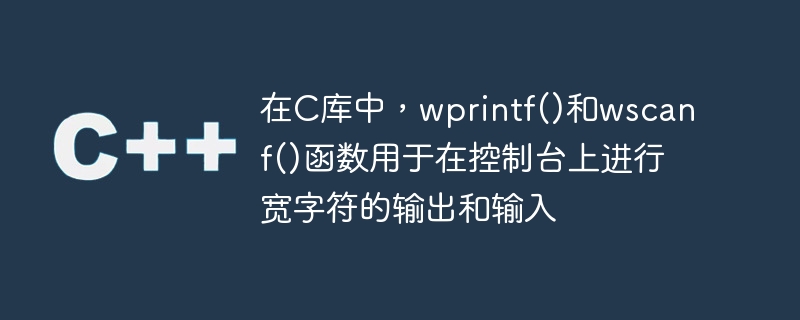 Backend Development
Backend Development
 C++
C++
 In the C library, the wprintf() and wscanf() functions are used for wide character output and input on the console.
In the C library, the wprintf() and wscanf() functions are used for wide character output and input on the console.
In the C library, the wprintf() and wscanf() functions are used for wide character output and input on the console.

Here we will see the wprintf() and wscanf() functions in C language. These are the printf() and scanf() functions for wide characters. These functions are located in wchar.h
wprintf() function is used to print wide characters to standard output. Wide string formats may contain format specifiers starting with the % symbol, which are replaced by the variable value passed to wprintf().
The syntax is as follows -
int wprintf (const wchar_t* format, ...);
The function adopts the following format. This format is a pointer to a null-terminated wide string that will be written to the console. It will contain wide characters and some format specifiers starting with %. Then (…) represents additional parameters. These are the data that will be printed, and they appear in order according to the format specifiers.
This function returns the number of characters printed. On failure, a negative value may be returned.
Example
#include <stdio.h>
#include <wchar.h>
main() {
wint_t my_int = 10;
wchar_t string[] = L"Hello World";
wprintf(L"The my_int is: %d </p><p>", my_int);
wprintf(L"The string is: %ls </p><p>", string);
}Output
The my_int is: 10 The string is: Hello World
The wscanf() function is used to get data from the console and store them into appropriate variables. The additional parameters should point to allocated objects whose types are specified by the corresponding format specifiers in the format string.
Example
#include <stdio.h>
#include <wchar.h>
main() {
wint_t my_int = 10;
wprintf(L"Enter a number: ");
wscanf(L"%d", &my_int);
wprintf(L"The given integer is: %d </p><p>", my_int);
}Output
Enter a number: 40 The given integer is: 40
The above is the detailed content of In the C library, the wprintf() and wscanf() functions are used for wide character output and input on the console.. For more information, please follow other related articles on the PHP Chinese website!

Hot AI Tools

Undresser.AI Undress
AI-powered app for creating realistic nude photos

AI Clothes Remover
Online AI tool for removing clothes from photos.

Undress AI Tool
Undress images for free

Clothoff.io
AI clothes remover

AI Hentai Generator
Generate AI Hentai for free.

Hot Article

Hot Tools

Notepad++7.3.1
Easy-to-use and free code editor

SublimeText3 Chinese version
Chinese version, very easy to use

Zend Studio 13.0.1
Powerful PHP integrated development environment

Dreamweaver CS6
Visual web development tools

SublimeText3 Mac version
God-level code editing software (SublimeText3)

Hot Topics
 What are the types of values returned by c language functions? What determines the return value?
Mar 03, 2025 pm 05:52 PM
What are the types of values returned by c language functions? What determines the return value?
Mar 03, 2025 pm 05:52 PM
This article details C function return types, encompassing basic (int, float, char, etc.), derived (arrays, pointers, structs), and void types. The compiler determines the return type via the function declaration and the return statement, enforcing
 Gulc: C library built from scratch
Mar 03, 2025 pm 05:46 PM
Gulc: C library built from scratch
Mar 03, 2025 pm 05:46 PM
Gulc is a high-performance C library prioritizing minimal overhead, aggressive inlining, and compiler optimization. Ideal for performance-critical applications like high-frequency trading and embedded systems, its design emphasizes simplicity, modul
 What are the definitions and calling rules of c language functions and what are the
Mar 03, 2025 pm 05:53 PM
What are the definitions and calling rules of c language functions and what are the
Mar 03, 2025 pm 05:53 PM
This article explains C function declaration vs. definition, argument passing (by value and by pointer), return values, and common pitfalls like memory leaks and type mismatches. It emphasizes the importance of declarations for modularity and provi
 C language function format letter case conversion steps
Mar 03, 2025 pm 05:53 PM
C language function format letter case conversion steps
Mar 03, 2025 pm 05:53 PM
This article details C functions for string case conversion. It explains using toupper() and tolower() from ctype.h, iterating through strings, and handling null terminators. Common pitfalls like forgetting ctype.h and modifying string literals are
 Where is the return value of the c language function stored in memory?
Mar 03, 2025 pm 05:51 PM
Where is the return value of the c language function stored in memory?
Mar 03, 2025 pm 05:51 PM
This article examines C function return value storage. Small return values are typically stored in registers for speed; larger values may use pointers to memory (stack or heap), impacting lifetime and requiring manual memory management. Directly acc
 distinct usage and phrase sharing
Mar 03, 2025 pm 05:51 PM
distinct usage and phrase sharing
Mar 03, 2025 pm 05:51 PM
This article analyzes the multifaceted uses of the adjective "distinct," exploring its grammatical functions, common phrases (e.g., "distinct from," "distinctly different"), and nuanced application in formal vs. informal
 How does the C Standard Template Library (STL) work?
Mar 12, 2025 pm 04:50 PM
How does the C Standard Template Library (STL) work?
Mar 12, 2025 pm 04:50 PM
This article explains the C Standard Template Library (STL), focusing on its core components: containers, iterators, algorithms, and functors. It details how these interact to enable generic programming, improving code efficiency and readability t
 How do I use algorithms from the STL (sort, find, transform, etc.) efficiently?
Mar 12, 2025 pm 04:52 PM
How do I use algorithms from the STL (sort, find, transform, etc.) efficiently?
Mar 12, 2025 pm 04:52 PM
This article details efficient STL algorithm usage in C . It emphasizes data structure choice (vectors vs. lists), algorithm complexity analysis (e.g., std::sort vs. std::partial_sort), iterator usage, and parallel execution. Common pitfalls like





